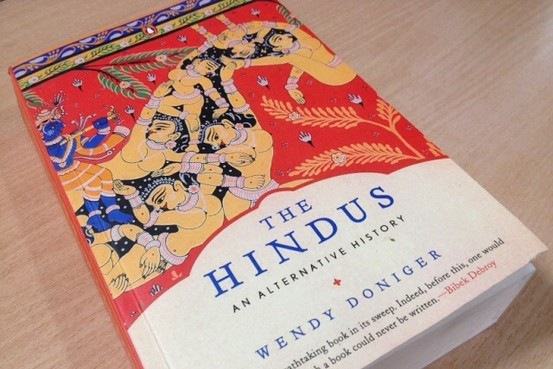After the egging, the pulping.
In London in 2003, a protester threw an egg at University of Chicago Sanskrit scholar Wendy Doniger, who was lecturing on the popular Hindu epic the Ramayana. The egg missed its mark, but during the Q-and-A other protesters continued the assault, insisting that non-Hindus such as Doniger had no right to tell them what Hinduism is all about.
This month, Penguin Books India agreed to withdraw Doniger’s “The Hindus: An Alternative History” from Indian bookstores and pulp any remaining copies. The settlement came in response to a complaint filed by Dinanath Batra, head of Shiksha Bachao Andolan, a Hindu fundamentalist group that opposes sex education in Indian schools and textbooks that deviate from its Hinduvta (“Hinduness”) interpretation of Indian history.
If you see a culture war here, you are not far wrong. Like the American culture wars, this contest features a “moral majority” that claims to speak for all true believers, even as it laments its victimhood at the hands of a secular state.
In his complaint, Batra played the Jerry Falwell figure, blasting Doniger as a Jezebel — “a woman hungry of sex” — peddling “perverse” interpretations of Hindu scriptures. “The Hindus” is “riddled with heresies and factual inaccuracies,” he said, but his core complaint is that the book “hurt the religious feelings of millions of Hindus.”
As Doniger books go, this one has very little sex in it. But it is offensive. As Doniger told BBC World Service, she knew “that people like Mr. Batra would hate it.”
According to Hindu nationalists, there is one unchanging and eternal Hinduism, which just so happens to be their own. Doniger’s alternative history, which heeds the voices of women and Dalits (“untouchables”) and observes changes in the tradition over time, shows that there are nearly as many Hinduisms as there are Hindus. To her, Hinduism is a polyphonic symphony. To Batra, it is one note, played over and over again.
Books have been challenged in the USA, but First Amendment rights typically triumph. In India, free speech is increasingly muzzled. India banned Salman Rushdie’s novel “The Satanic Verses” a quarter-century ago. Two decades ago, Hindu nationalists went after “Kali’s Child,” a psychoanalytic study of the Indian holy man Ramakrishna by American Indologist Jeffrey Kripal, and discovered in the process how to spin hatred of foreign authors into political gold. In recent years, they have targeted films and art exhibitions as well as books on Gandhi, cows and the Hindu deity Ganesha.
Indian intellectuals responded to the Doniger imbroglio by lamenting “the pulping of liberal India” and the “Talibanization” of the world’s largest democracy. “The argumentative Indian is being replaced by the offended Indian,” wrote political scientist Pratap Bhanu Mehta, “the tolerant Indian by the intolerant mob.”
Many fingered Penguin for bowing to a bully. “Even though there is no fatwa, no ban, not even a court order, you have not only caved in, you have humiliated yourself abjectly before a fly-by-night outfit,” wrote novelist Arundhati Roy in an open letter to her publisher. Other authors demanded that their Penguin contracts be pulped.
Penguin responded by invoking its “moral responsibility to protect our employees against threats and harassment,” and the need to “respect the laws of the land in which it operates, however intolerant and restrictive those laws may be.”
Other Indian intellectuals — including thousands of signers of a petition published last week in The Hindu — called for legal reform, focusing on the Indian Penal Code’s Section 295A, which, by criminalizing “malicious acts intended to outrage religious feelings,” has invited an epidemic of the piously aggrieved.
Banishment of “The Hindus” from India is emboldening the culture warriors who claim to speak on behalf of all Hindus (and are now vowing to go after other Doniger books). But this is not a victory for “Hinduism” over its American despisers. It is a victory of one group of Hindus over another.
In “The Hindus,” which exudes love of scholarship and love of the Hindu tradition, I hear a voice, reminiscent of that famous question of the African-American abolitionist Sojourner Truth: “Ain’t I a woman?” “Ain’t I a Hindu?” it says, in the voices of the millions of believers whom Hindu fundamentalists are determined to silence.
~ huffingtonpost.com/Stephen Prothero

